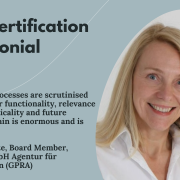10 words that weaken your message
Written by – Lorraine Forest-Turner, PRCA trainer
What message do we convey when we say or write “I’m just checking if Friday’s meeting is still on” or “this is just an example of our creative work”?
‘Just’ has become the new ‘basically’, the word many of us habitually use without even realising it.
While ‘basically’ adds nothing, but doesn’t necessarily harm our communications, ‘just’ weakens our words by trivialising the thing that follows it.
Remove ‘just’ from the phrases above and see how much more important the meeting and the creative work sound without it.
Pruning out the weak words
Any good editor will glance at a piece of writing and remove weak and unnecessary words.
So what are the biggest culprits? Which words should we banish from our communications? Or at least use cautiously.
Just
Use ‘just’ when you want to convey something happened in that moment, when you mean ‘merely’ or when referring to fairness and justice.
- He had just hid the evidence when the police arrived.
- He had just enough time to hide the evidence before the police arrived.
- Based on the evidence presented at the trial, the judge made a just decision.
That
You’d be surprised how often you can eliminate ‘that’ from a sentence. Read the following sentences out loud, first with ‘that’ and then without it. Which sound better?
- The Government believes that Universal Credit will make it easier for people to move into work.
- Please let us know if there’s any information that you feel we should take into account.
- He was on holiday at the time that the decision was made.
Of
Like ‘that’, when used correctly, we’d be lost without ‘of’. However there are numerous times when ‘of’ can be eliminated. Each of the following can lose ‘of’ (or phrases containing ‘of’) without affecting the meaning. (No, you can’t lose ‘of’ from that last sentence. And you can’t lose ‘that’ from that one. But you can get stuck in a loop if you continue in this vein.)
- He threw the evidence out of the window.
- We’re in receipt of your letter. (We’ve received your letter.)
- She made a total of £86 at the car boot sale. (She made £86 at the car boot sale.)
Think/feel/believe
These words are often used to soften harsh messages or express an unpopular opinion. However they can weaken your message by implying what you’re saying isn’t factually true. Read them with and without the opinions and see how they weaken and strengthen the message.
- I think John isn’t up to the job.
- I feel the campaign would be more effective in December.
- I believe we’ve made the right decision.
Really/very/absolutely/completely
Too many qualifiers in your speech/writing can make you sound unclear or less knowledgeable. We tend to rely on words such as ‘really’, ‘very’, ‘absolutely’ and ‘completely’ when we don’t know (or can’t be bothered finding) a more appropriate word.
- He’s really good at singing. (He has a three octave range.)
- The system is very fast. (The system downloads data at 100 mbps.)
- You’ve absolutely ruined the design. (You’ve used five different fonts on one page.)
Once you start eliminating these unnecessary words from your communications, you should notice people paying more attention to what you say.
Here are a few more to watch out for/use sparingly:
- Basically
- Essentially
- Generally
- Kind of
- Mostly
- Pretty
- Quite
- Rather
- Slightly
- Somewhat
- Sort of
- Various
- Virtually
Lorraine Forest-Turner, a PRCA trainer, takes on the PRCA “Writing effective press releases and “Honing your Copywriting skills” training courses.













